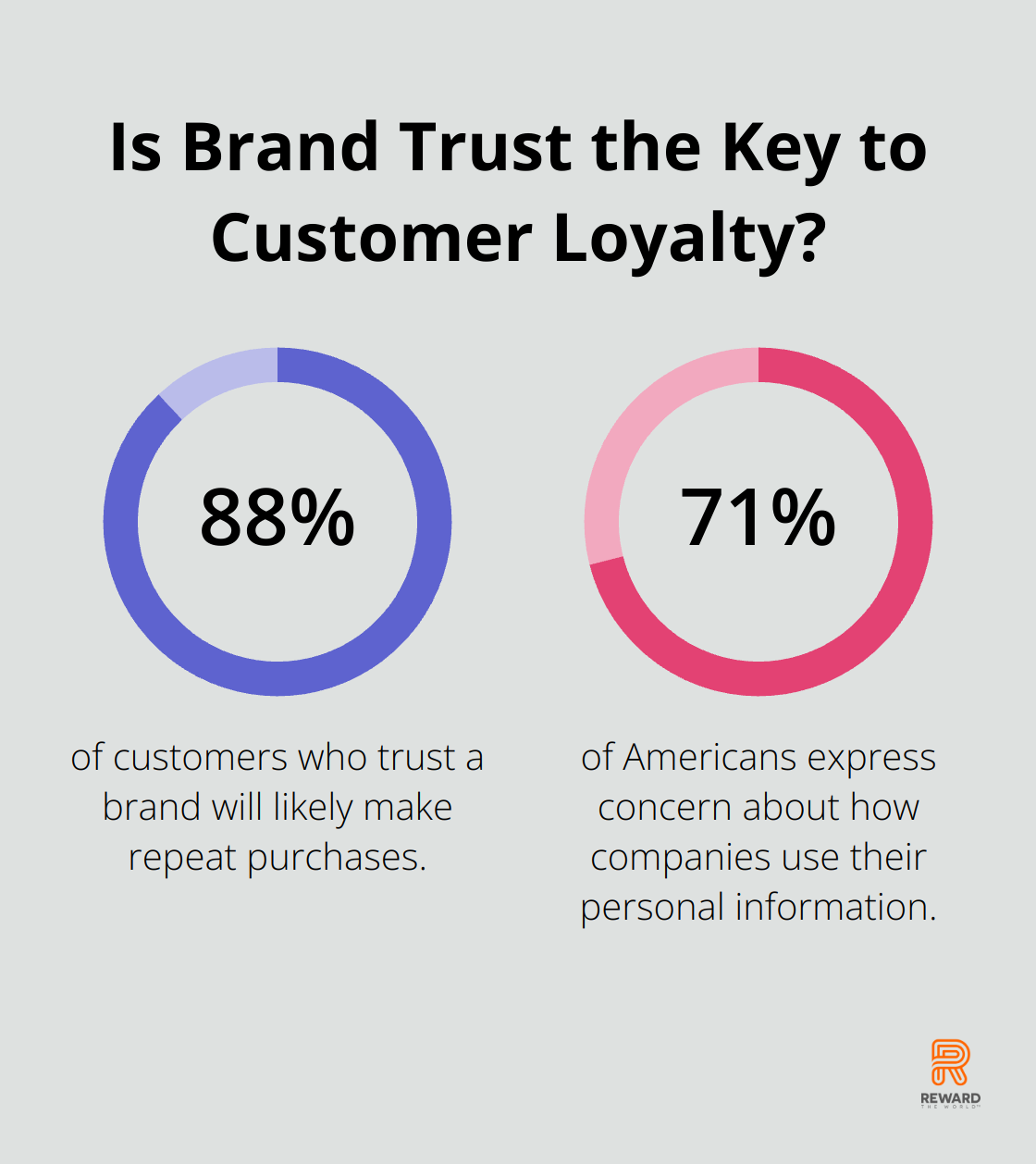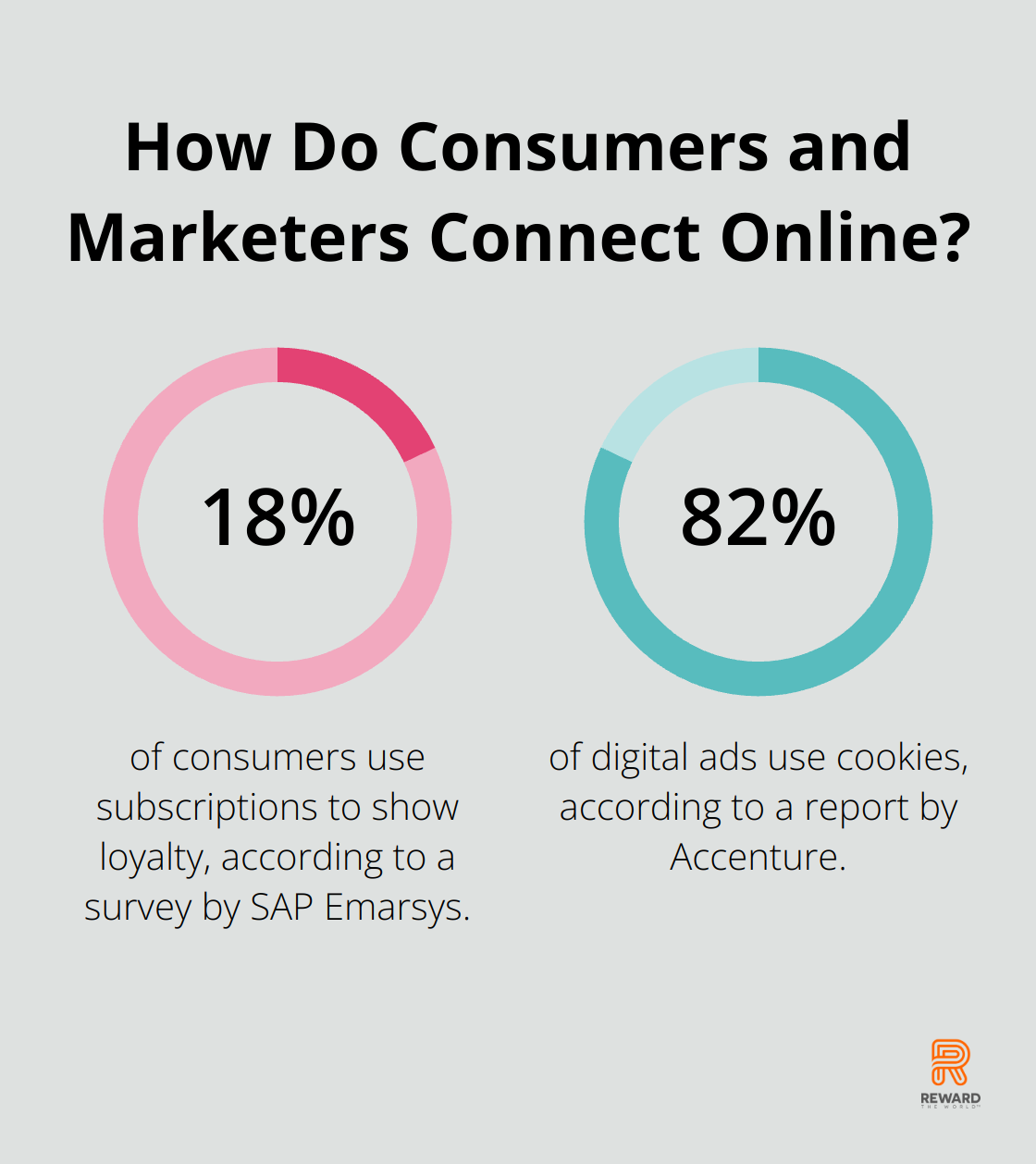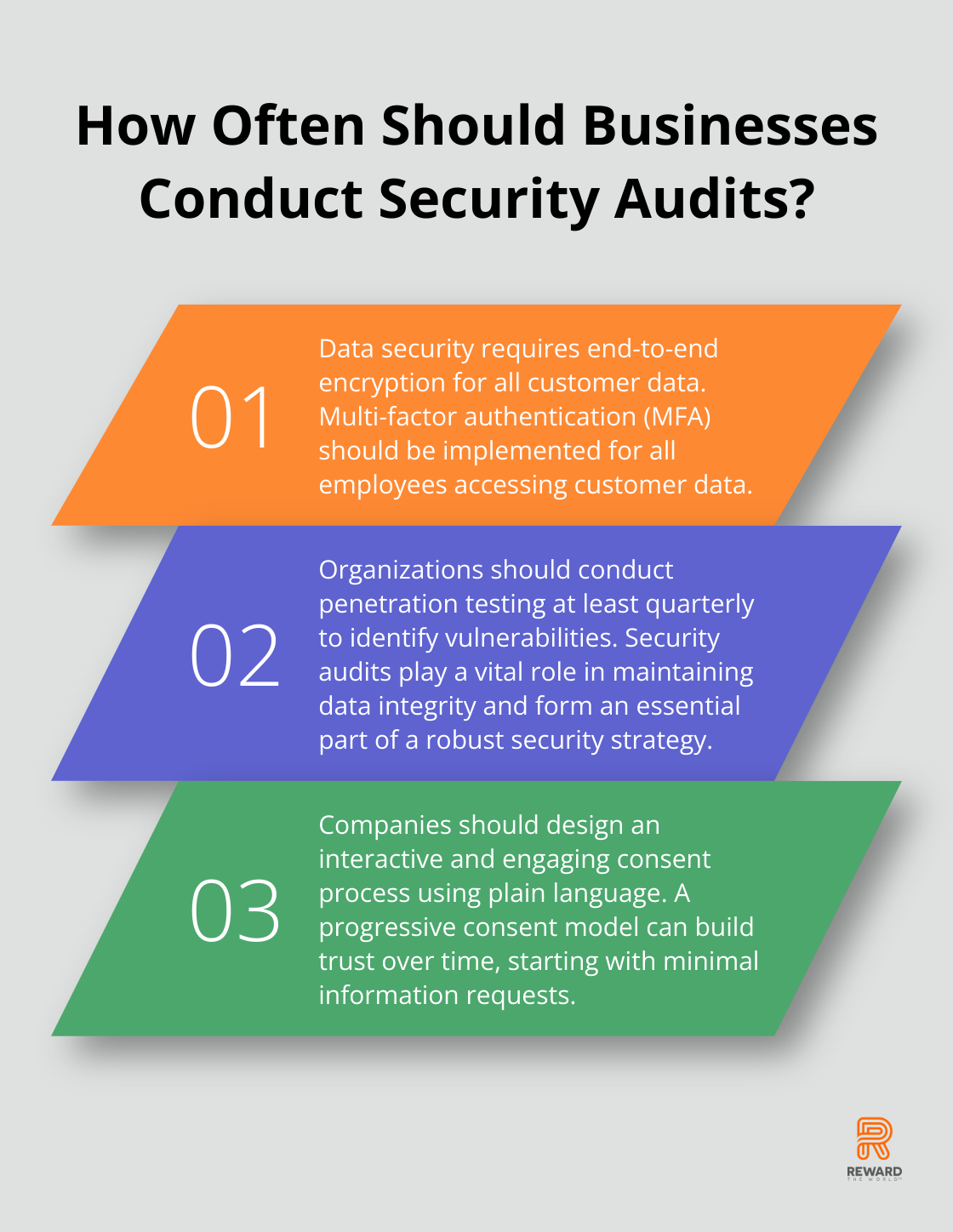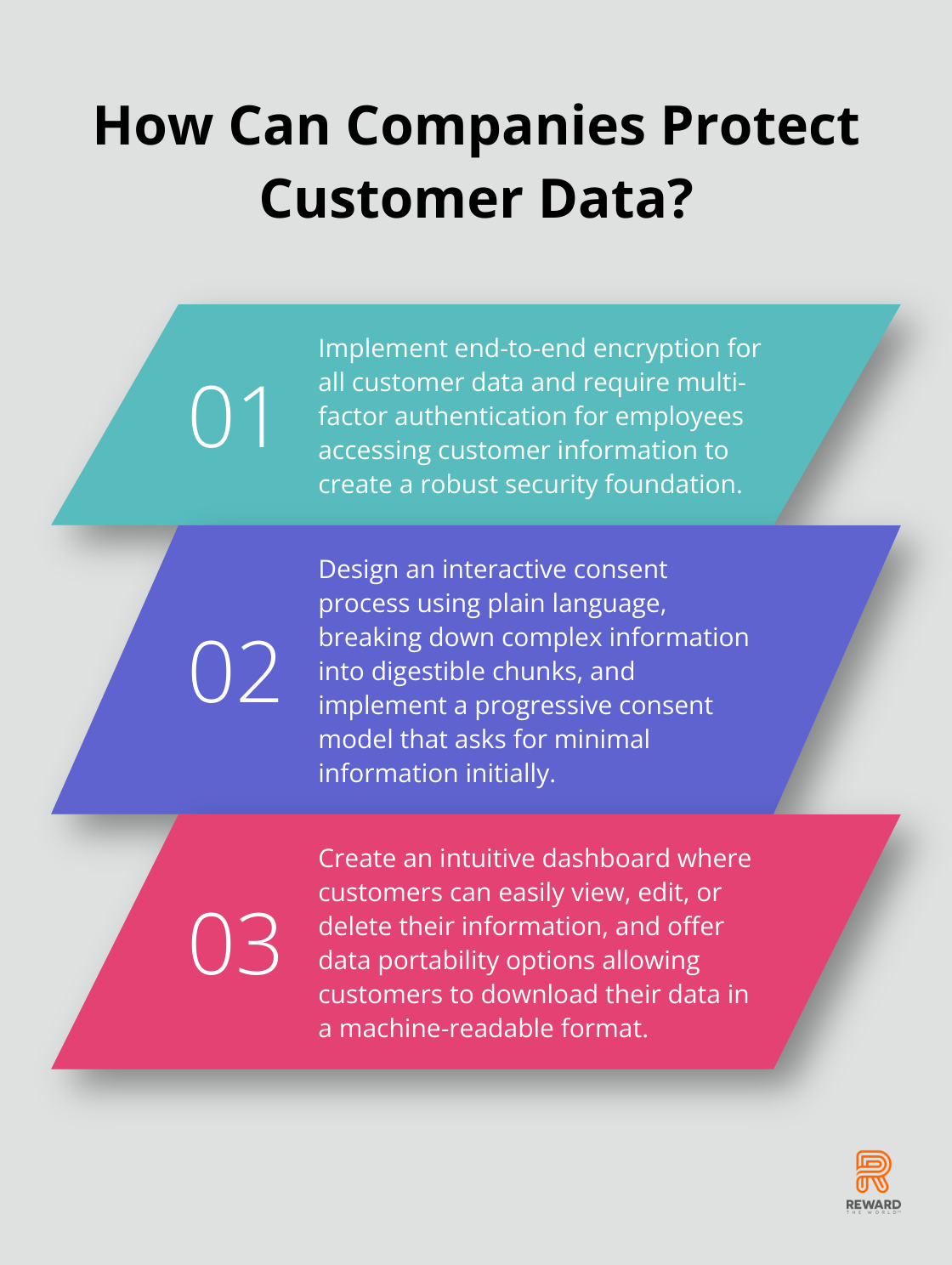
At Reward the World, we understand the delicate balance between gathering valuable customer insights and respecting privacy. In today’s data-driven landscape, businesses must navigate the complexities of ethical data collection.
This blog post explores how rewards programs can be leveraged as part of a first-party data strategy, while maintaining customer trust and complying with regulations. We’ll dive into best practices for transparent data collection and ethical use, ensuring both businesses and customers benefit from this approach.
Why Ethical Data Collection Matters
Trust: The Foundation of Customer Relationships
In the digital age, data powers business success. However, ethical collection practices are non-negotiable. Trust forms the cornerstone of any thriving business relationship. A Deloitte study reveals that 88% of customers who trust a brand will likely make repeat purchases. This statistic highlights the vital role of ethical data collection in fostering enduring customer relationships.

To build trust, companies must prioritize transparency in their data collection practices. Clear communication about what data is collected, why it’s collected, and how it will be used is essential. This transparency isn’t just good practice-it’s what customers demand. A Pew Research Center survey found that 71% of Americans express concern about how companies use their personal information.
Navigating the Regulatory Landscape
Data protection regulations (such as GDPR and CCPA) have transformed the data collection landscape. These laws present opportunities for businesses to showcase their commitment to customer privacy and address ethical concerns such as the user’s right to consent to data collection, the right of a user to request deletion of their data, and the right of access to personal information.
Companies should implement robust consent mechanisms. Customers need easy options to opt in or out of data collection. A tiered approach allows customers to choose between basic and comprehensive data sharing. This strategy respects customer preferences and aligns with regulatory requirements.
Regular audits of data practices are essential. These audits ensure ongoing compliance and identify potential issues before they escalate. Partnering with data protection experts helps companies stay ahead of regulatory changes.
Your Brand’s Reputation Hinges on Data Ethics
In our interconnected world, a single data breach or unethical practice can severely damage a brand’s reputation. The cost extends beyond financial losses-it’s the erosion of customer trust, which can take years to rebuild.
Companies must invest in strong data security measures. This includes encryption, multi-factor authentication, and comprehensive incident response plans. Employee training on data security best practices is crucial-staff members serve as the first line of defense against data breaches.
Proactive communication about data practices is key. Companies shouldn’t wait for a crisis to discuss their commitment to data ethics. Regular updates to privacy policies and easy accessibility for customers demonstrate ongoing dedication to ethical practices.
The Power of Ethical Data Collection Platforms
While many platforms struggle with ethical data collection, some stand out from the crowd. Platforms designed with privacy and security at their core offer GDPR-compliant solutions that respect customer data while providing powerful insights for businesses.
Prioritizing ethical data collection doesn’t just ensure regulatory compliance-it builds a foundation for long-term customer loyalty and business success. In the next section, we’ll explore how rewards programs can be leveraged as part of an ethical first-party data strategy, transforming customer engagement and driving business growth.
How Rewards Programs Ethically Collect Customer Data
The Goldmine of First-Party Data
Rewards programs offer a wealth of first-party data. This includes transactional data (purchase history, frequency, and amounts), demographic information (age, location, preferences), and behavioral data (how customers interact with brands across channels). Companies can use this data to improve customer retention by enabling personalized experiences that keep customers coming back for more.

However, responsible data use takes precedence over mere collection. Companies should focus on data minimization, collecting only what they need and will actually use to improve the customer experience.
The Power of Value Exchange
Customers show more willingness to share information when they perceive clear value in return. A survey by SAP Emarsys found that 18% of consumers use subscriptions to show loyalty. This statistic demonstrates the power of incentives in driving data sharing.
Effective rewards programs offer a range of benefits:
- Personalized discounts based on purchase history
- Early access to new products or services
- Exclusive content or experiences
- Gamification elements that make engagement fun
Companies must make the value proposition clear. Customers should understand exactly what they receive in exchange for their data.
Transparency: The Cornerstone of Ethical Collection
Transparency builds trust. Companies should be upfront about what data they collect and how they use it. Here are some best practices:
- Clear opt-in processes: Make it easy for customers to understand what they agree to.
- Granular control: Allow customers to choose what data they share and how it’s used.
- Regular updates: Keep customers informed about how their data improves their experience.
- Easy access: Provide simple ways for customers to view and manage their data.
Balancing Personalization and Privacy
While personalization enhances customer experiences, companies must strike a balance with privacy concerns. A report by Accenture found that 82% of digital ads use cookies. Marketers must find ways to entice customers with hyperpersonalized experiences while protecting their privacy.
To address this, companies should:
- Use data to create meaningful, not intrusive, experiences
- Implement strong data security measures (encryption, multi-factor authentication)
- Regularly audit data practices to ensure ongoing compliance with regulations
The Role of Technology in Ethical Data Collection
Advanced technologies play a crucial role in ethical data collection through rewards programs. AI and machine learning algorithms can help identify patterns and preferences without compromising individual privacy. Blockchain technology offers potential for secure, transparent data management in loyalty programs.
Platforms like Reward the World (with its 250 million-user base and availability in 15 languages) stand out by prioritizing ethical data collection. These solutions respect customer data while providing powerful insights for businesses, setting a new standard in the industry.
As we move forward, the next section will explore how companies can ensure the ethical use of customer data once it’s collected, further strengthening the trust between businesses and consumers.
How Businesses Can Safeguard Customer Data
Build an Impenetrable Data Fortress
Data security demands unwavering attention. Companies must implement end-to-end encryption for all customer data, both in transit and at rest. This approach adds multiple layers of protection to sensitive data, safeguarding information from unauthorized access, even in the event of a breach.

Multi-factor authentication (MFA) adds a critical layer of protection. Companies should require MFA for all employees who access customer data. This practice significantly reduces the risk of unauthorized entry.
Security audits play a vital role in maintaining data integrity. Organizations should conduct penetration testing at least quarterly to identify vulnerabilities before malicious actors can exploit them. Many companies overlook this step, but it forms an essential part of a robust security strategy.
Master the Art of Consent
Clear consent goes beyond a simple checkbox. Companies should design their consent process to be interactive and engaging. Use plain language to explain what data you collect and why. Break down complex information into digestible chunks. Transparency in consent management is key to reinforcing trust. Businesses should clearly communicate why they are collecting data and how it will be used.
A progressive consent model can build trust over time. Start by asking for minimal information and gradually request more data as the customer engages with your program. This approach respects customer boundaries and fosters a sense of control.
Annual reminders allow customers to review and update their preferences. This proactive approach demonstrates a commitment to transparency and customer empowerment.
Empower Customers Through Data Control
Granular control over data builds trust. Create an intuitive dashboard where customers can view, edit, or delete their information. Avoid burying these options in complex menus.
Data portability options show respect for customer rights. Allow customers to download their data in a machine-readable format. This feature not only complies with regulations like GDPR but also reinforces the idea that customers own their information.
A clear “right to be forgotten” process protects customer privacy. When a customer requests account deletion, ensure all their data disappears permanently from your systems (including backups). Document this process clearly and provide confirmation to the customer.
Leverage Ethical Platforms
While many platforms struggle with ethical data collection, some stand out. Reward the World prioritizes privacy and security, offering GDPR-compliant solutions that respect customer data while providing powerful insights for businesses.
Final Thoughts
Ethical data collection through rewards programs empowers businesses to implement a robust first-party data strategy. Companies that prioritize transparency, consent, and data security will build trust while gathering valuable insights to enhance customer experiences. These practices lead to increased customer loyalty, improved personalization, and a competitive edge in an increasingly privacy-conscious market.

As regulations evolve and consumer awareness grows, businesses that prioritize ethical data collection will position themselves for long-term success. AI and machine learning will play a larger role in analyzing data patterns while preserving individual privacy. Blockchain technology may offer new possibilities for secure, transparent data management in the future.
Reward the World offers GDPR-compliant solutions that respect customer data while providing powerful insights for businesses. With its global reach, instant reward delivery, and robust analytics, Reward the World exemplifies how ethical data practices can drive business growth and customer satisfaction. Companies that embrace ethical data collection through rewards programs will build stronger customer relationships and create personalized experiences that drive loyalty and growth.
